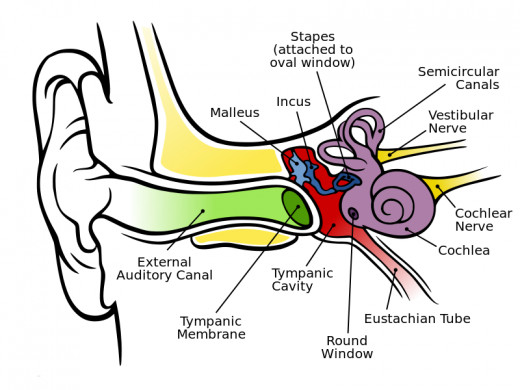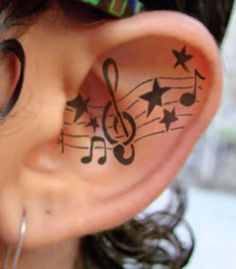Musical Ear Tinnitus
My mother-in-law's experience
I was caregiver for my mother-in-law for several years, as she suffered from a variety of health issues. Her most severe issue was Parkinson’s disease but she also had unrelated hearing loss, which led to her musical ear syndrome, also known as MES.
We first discovered my mother-in-law’s musical ear syndrome because she complained about a fast food restaurant that was located near her house, saying they were playing loud music all night long. We knew this drive-in did play music during the day, as it is a facility with carhops, and people commonly park and eat there and listen to the music the restaurant plays. But we were curious why they would play the music after hours so we contacted them, and they said the music is turned off at night. That’s when we knew there was something wrong.
We visited an audiologist and an otolaryngologist (ear, nose and throat specialist) who explained what tinnitus was and why my mother-in-law was hearing these phantom noises and music. It was reassuring to understand that this was a medical condition related to hearing loss, and that “hearing things” was not a sign of mental illness.
Anatomy of the human ear

What is tinnitus?
Many people (10 to 15% of the population) suffer from regular tinnitus, which causes them to have a recurring sound inside their ear. It can affect one or both ears. The sounds vary and have been described as ringing, chirping, whirring, clicking or whooshing. It can also be a steady single tone. For some people, the unwanted noise comes and goes but for others it is constant. There is no cure or even medication that can alleviate the symptoms of tinnitus but therapy and white noise can help patients deal with their tinnitus.
How is tinnitus different from musical ear syndrome?
A much smaller percentage of people who suffer from tinnitus develop musical tinnitus, where instead of simple sounds, the patient hears music inside their ears. And rarer still, there are a few people who have what is known as objective tinnitus, where the sounds created inside the person’s head can actually be heard by other people.
The causes of tinnitus are unclear, but it often afflicts people who have suffered hearing loss, either from exposure to loud noises for an extended period of time, or simply from aging. Doctors believe that it is the brain compensating for the normal noises that one is surrounded by every day. The brain has become accustomed to dealing with a wide variety of auditory input, and with hearing loss, there is not much work for that section of the brain to do. So it starts to create sounds on its own!
Of course some people who suffer from auditory hallucinations do have psychiatric problems. This causes many people who develop tinnitus or musical ear to remain silent about their condition for fear of being diagnosed with schizophrenia or some other mental illness. The big difference between a person with a psychiatric condition who hears things, and a person with tinnitus, is the nature of what is heard. Those suffering from a mental disorder will believe they are in a two-way conversation with the voice in their head, and it is often a conversational hallucination. A person with tinnitus doesn’t believe that they are being directed or controlled by the noise inside their head because it isn’t a conversation or even words – it may be a song, but it is not as if they are being spoken to by the singer.
Although there is no cure for tinnitus or musical ear syndrome, the patient can often take steps to make dealing with the sounds a little easier. The condition can sometimes be caused by prescription medications. If so, it might be switched for something that is equally effective but won’t cause the auditory hallucinations.
Music to your ears?

How to deal with it
Stress or anxiety can also increase the occurrence of musical tinnitus, so do whatever you can to avoid tension in your life. Find healthy outlets for your tension like yoga or meditation.
Being alone in a quiet environment may aggravate the condition so try to be engaged in social activities and involved with other people more often.
Increasing the auditory input in your life can also help. If you have hearing aids, use them as the brain will have more outside sounds to process. Listen to the TV, radio or recorded music regularly. Consider getting a “white noise” machine.
Musical ear syndrome is difficult to deal with because it seems so real. When you have an earworm, you hear the same song or chorus repeated over and over, but you are aware that it is just in your mind. With MES, the experience is different because the music appears to be originating from outside of the head. It is directional and the person suffering will point to a neighbor or other room of their home as the source of the sound.
It is sometimes difficult to convince the person that the music they hear isn’t real. Explaining the situation can help, and assuring the person that they are not crazy and can admit that the sounds are not real. Have then spend some time outside of their home where they commonly hear the music. If they hear the same tunes in a different setting, this can often convince the person the sound is being generated inside their own head.
It can also be helpful to have them attempt to "shut out" the sound by covering their ears with their hands or a pillow. If the sound remains constant instead of muted as an outside sound would be, this can also help the person come to grips with the fact that the sound is being generated inside their brain.
Woman Constantly Hears Songs Due to Rare Disorder
Want more information?

Facebook Support Group
If you or a loved one suffer from MES and you would like to share your experience or chat with others who are suffering form this condition, there is a Facebook support group you can join at:




